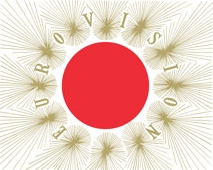THE
HISTORY OF THE
EUROVISION
SONG
CONTEST
Caffé Latté looks back on
the key moments of Europe’s annual competition.
1969

The 1968 Eurovision Song Contest caused an upset when Cliff Richard's popular (and superior) UK entry "Congratulations" was beaten by 1 point by the Spanish entry "La, La, La". In 1969, there was even more derision caused by the outcome.
Madrid played host city to the 16 nations assembled for the ESC. When the votes were announced by the participating countries' juries, the counting was close. Victory was most likely for 1 of 4 nations: United Kingdom, France, Spain and The Netherlands. After Finland distributed the last of its jury votes, the 4 countries finished with an identical score. This outcome was so unexpected, no back-up plan was in place and so, all 4 entries were declared winners. The 4-way tie was shared by the France's "Un Jour, Un Enfant", the Spanish entry "Vivo Cantando", the British pop tune "Boom Bang A Bang" and the Dutch song "De Troubadour". The rules in place today prevent another tie. Had these rules been applied back in 1969, Frida Boccara would have grasped victory for France.
With 2 consecutive years of baffling outcomes, Eurovision's future was in doubt. Many suspected that the ESC was doomed. Norway, Sweden, Finland, Austria and Portugal declined to participate in 1970. That left only 12 nations competing in Amsterdam. All 4 winning countries had expressed interest in hosting. The Netherlands won a ballot and the 1970 show renewed confidence in the idea of Eurovision.


No comments:
Post a Comment